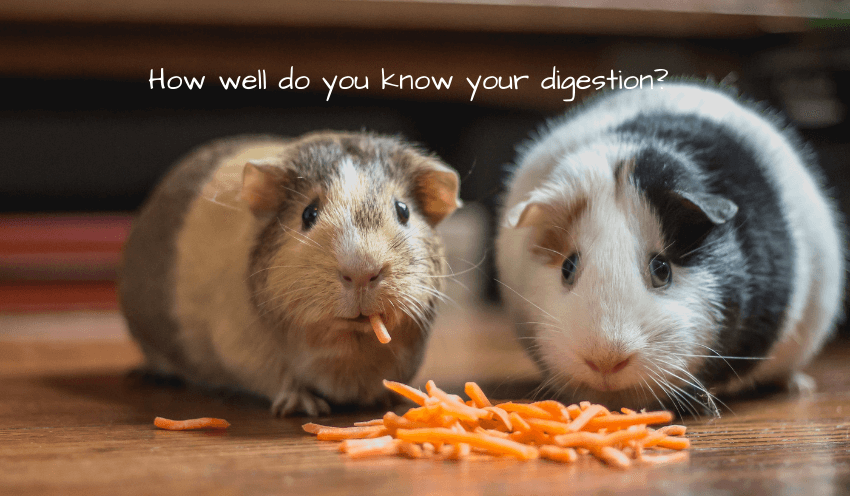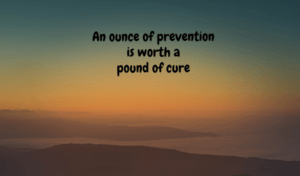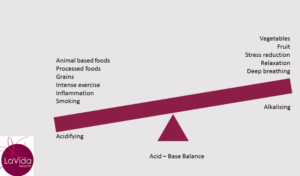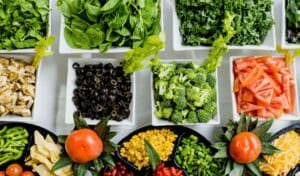If you have any kind of health issue, please pay attention to the role of your digestive system (even if it feels unrelated to your problem).
Your digestive system (aka the gastrointestinal tract or GIT) is vital for keeping you healthy.
The primary role of the GIT is to break down your food into its components, safely remove what you don’t need and turn what you do need into something your body can use. It needs to be working well to do its job effectively.
Given that your digestive health relies so heavily on what you eat and drink, (and most western diets are low in fruit and vegetables), it is not uncommon for my clients to present with digestive complaints. Or they may have other health issues that can be traced back to poor digestive function.
Most of us have experienced digestive complaints at some point in our lives. I’m sure you can relate to that. They may be a short-lived bout of gastro or a more chronic, ongoing problem like irritable bowel syndrome (IBS), bloating, constipation, diarrhoea or inflammatory bowel disease (IBD). Sometimes the solutions are obvious and straightforward but other times they require a bit more investigation.
What you eat and drink dictates the health of your digestive system and therefore your overall well-being.
Your diet directly affects every system in your body.
So let’s start with the basics. What organs make up your digestive system? What are some of the common signs of poor digestive function? And, most importantly, what are some simple things you can do to improve your digestion?
How does your digestive system work?
The digestive system starts in the head and ends with the anus. It includes the oesophagus, stomach, small intestine and large intestine. It relies on organs such as the liver, pancreas and gallbladder to support the breakdown, absorption and utilisation of nutrients to keep you alive and well.
The Head (mouth and brain)
Your digestive processes actually start when you look at and smell food.
By taking the time to engage your senses of sight and smell you kick off your digestion. Smelling your food signals to your stomach to start producing gastric juices in readiness for the arrival of food. This is your brain at work.
The sight and aroma of food also signal our salivary glands to produce saliva. (Take a moment to visualise your favourite food. You might notice that you start to salivate just thinking about it).
When we come to the mouth, it’s all about chewing. This is a very important step in the digestive process and one that is often dismissed in the rush to eat.
The act of chewing your food starts to break it down into more digestible pieces. The food is mixed with your saliva which contains essential enzymes, starting the process of fat, protein and carbohydrate digestion.
The stomach
In the stomach, your chewed food meets stomach acid. The stomach starts to break down proteins and some nutrients such as non-haem iron, calcium and B12. It also absorbs minerals such as iodine and copper. The stomach does this by producing gastric juices such as hydrochloric acid and pepsinogen. A good level of stomach acid is the first line of defence against any pathogens you may consume. You need your stomach acid to maintain the sterility of the stomach.
The production of hydrochloric acid and pepsinogen require nutrients such as protein, zinc, vitamin B6 and magnesium. Eating a diet rich in these nutrients helps the stomach produce and secrete adequate gastric juices to stimulate your appetite and break down food.
Symptoms of low stomach acid include:
- Heartburn
- Reflux
- Cramping immediately after eating
- A lack of appetite
- Slow bowel transit time (the time it takes from consumption of food to elimination in the stool)
- Undigested food in your stool
The small intestine
The small intestine is approximately 5 – 7 metres in length and most of your digestion takes place here. The surface area approximates the size of a tennis court and it has three main parts; the duodenum, the jejunum and the ileum. It takes up most of the space in your abdomen.
The pancreas and gallbladder support digestion here. They release enzymes and bile that help to break down protein, carbohydrates and fats into molecules that can be absorbed through the intestinal lining into your bloodstream for use by your cells.
The small intestine, like the stomach, is intended to be a sterile environment. It may contain only a small amount of bacteria that usually live in harmony with the host (that’s you). However, if this environment is disrupted by having low levels of gastric juices, or an overgrowth of pathogenic bacteria (sometimes referred to as SIBO or small intestine bacterial overgrowth), there can be significant disruptions to your digestive health.
What is intestinal permeability?
The lining of the small intestine acts as a barrier, stopping pathogens and unwanted food particles from entering the bloodstream. In the case of food intolerances or allergies, high levels of stress, an inadequate diet or regular consumption of alcohol or certain medications, this barrier may be compromised. When the barrier is damaged it may allow the passage of unwanted molecules into the bloodstream. This is what we refer to as intestinal permeability or “leaky gut”. This may then trigger immune reactions and other symptoms in other parts of your body outside of your digestion.
You may need to address the health of your small intestine if you experience the following:
- Constipation and/or diarrhoea
- Headaches, allergies, food intolerances, autoimmune conditions or recurrent infections
- Eruptive skin conditions such as hives, eczema and psoriasis
- Excess burping and flatulence
- A worsening of symptoms if you eat fermented foods
The large intestine
The large intestine starts on the bottom right of your abdomen (where your appendix is located). It travels up towards your liver, across your body below your stomach and down the left side of your abdomen to your anus. It includes the caecum, colon then connects to the rectum and anus.
This is where your beneficial microflora lives (well the majority of them anyway). This microflora breaks down any remaining carbohydrates and proteins. Your microflora performs a wonderful process called fermentation which produces Vitamin K and some B Vitamins (like B12), as well as supports your immune system by taking care of any pathogenic and opportunistic bacteria, fungi and yeasts.
If your large intestine isn’t functioning as well as it should you may experience:
- Constipation
- Diarrhoea
- Blood or mucous in the stool (always get this checked out by a GP)
- Cramping
- Pain on bowel movements
- Flatulence
How can you improve your digestion?
Eat mindfully
Take your time to look at and smell your food before you start eating. As mentioned above, this stimulates the production of your gastric juices in readiness for food and therefore supports the breakdown of food. It helps if you are involved in meal preparation.
So, eat your meals away from screens and really take your time to chew each mouthful.
Tip: If you could recognise your food if you spat it out, you haven’t chewed it enough.
Enjoy some bitter foods before and with your meal
Bitter foods stimulate your appetite to produce gastric juices and saliva.
Lemon water 30 minutes prior to your meals gets your gastric juices flowing in readiness for your meal and is also a lovely tonic for your liver.
Foods such as rocket, dill, radish, kale and spinach are bitter foods so if you think you have issues with your digestion enjoy a salad with some of these ingredients with your meals.
Avoid drinking with a meal
Drinking with a meal dilutes your gastric juices and so your food may not break down as efficiently. So wait 30 minutes after eating before you drink any liquids.
Increase your vegetable intake
Almost everyone in Australia could do with increasing their daily vegetable intake. Vegetables provide fibre, vitamins, minerals and phytonutrients which all support a healthy digestive tract. Some vegetables such as leeks, garlic and onions are also prebiotics that feed the good bacteria in your bowel.
Include probiotic-rich foods into your meals
Probiotic foods include organic natural yoghurt, miso, tempeh, kimchi, sauerkraut, kombucha, kefir etc. These foods provide beneficial bacteria to your large intestine and support the health of your digestive tract. If you notice an increase in your symptoms when eating these types of foods then get in touch. We may need to do some investigation to determine if the cause of your complaint is small intestine bacterial overgrowth (SIBO).
Want more tips for improving your digestion, tap into 5 easy and effective ways to improve your digestion.
Does your digestion need some help?
As a naturopath, I always question my clients about their digestion as it plays such a vital role in their health. By rejuvenating their digestion, improving their microflora balance, and healing their gut we not only see fewer digestive symptoms but also improvement in pain, energy, brain fog, and more.
If you have resonated with any of the signs or symptoms outlined above start by following these suggestions. You might be surprised at the difference those small actions can make. If you don’t see the results you desire, please consider seeing a naturopath to help you optimise your digestive system and your overall health.
Overall health and vitality is dependent on good digestion.





